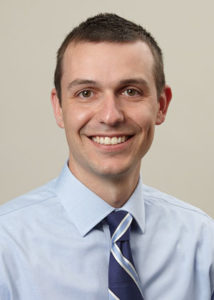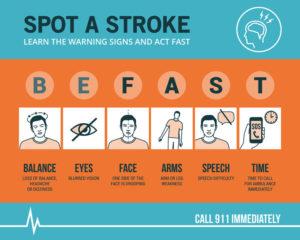
Caleb Heath, FNP, Vascular Neurology
Each year nearly 800,000 people experience a new or recurrent stroke.
It’s the fifth leading cause of death and a leading cause of adult disability in the U.S. The signs of a stroke can be hard to recognize. Common symptoms, like arm weakness, difficulty walking/lack of coordination, blurred vision, headache or dizziness can be easily ignored. Rather than call 911, many people wait for the symptoms to go away — only to realize later they suffered a mini stroke or that they could have prevented a major one.
To help you recognize the many different signs of a potential stroke, remember to Be Fast.
B.E. F.A.S.T. is a widely-accepted guide that can help you determine whether someone is having a stroke:
- B = Balance: Is the person experiencing dizziness or loss of balance?
 E = Eyes: Do they have blurred vision in one or both eyes?
E = Eyes: Do they have blurred vision in one or both eyes?- F = Face drooping: Ask the person experiencing symptoms to smile. Is one side of their face drooping?
- A = Arm Weakness: Tell the person to close their eyes and raise their arms above their head. Is the person unable to lift one or both arms?
- S = Speech Problems: When the person speaks, is their speech slurred, or are they having issues speaking or understanding words?
- T = Time to call 911: If the person is experiencing any of the above signs, call 911 immediately.
These signals are not as common, but are indicative of certain types of strokes:
- Quick, inquisitive behavior, sudden agitation, or confusion can result from a stroke that occurs in the right side of the brain
- Severe dizziness/imbalance, double vision, difficulty swallowing, vomiting can be seen with a stroke that occurs in the brain stem
While not a complete list of symptoms, these guidelines provide a helpful base of knowledge that could make a difference to you or someone you love.
Erlanger’s general neurology team diagnoses and treats common neurologic disorders including headaches, seizures, tremor, stroke and TIA, neuropathy, and multiple sclerosis. For more information, call 423-778-9001.







